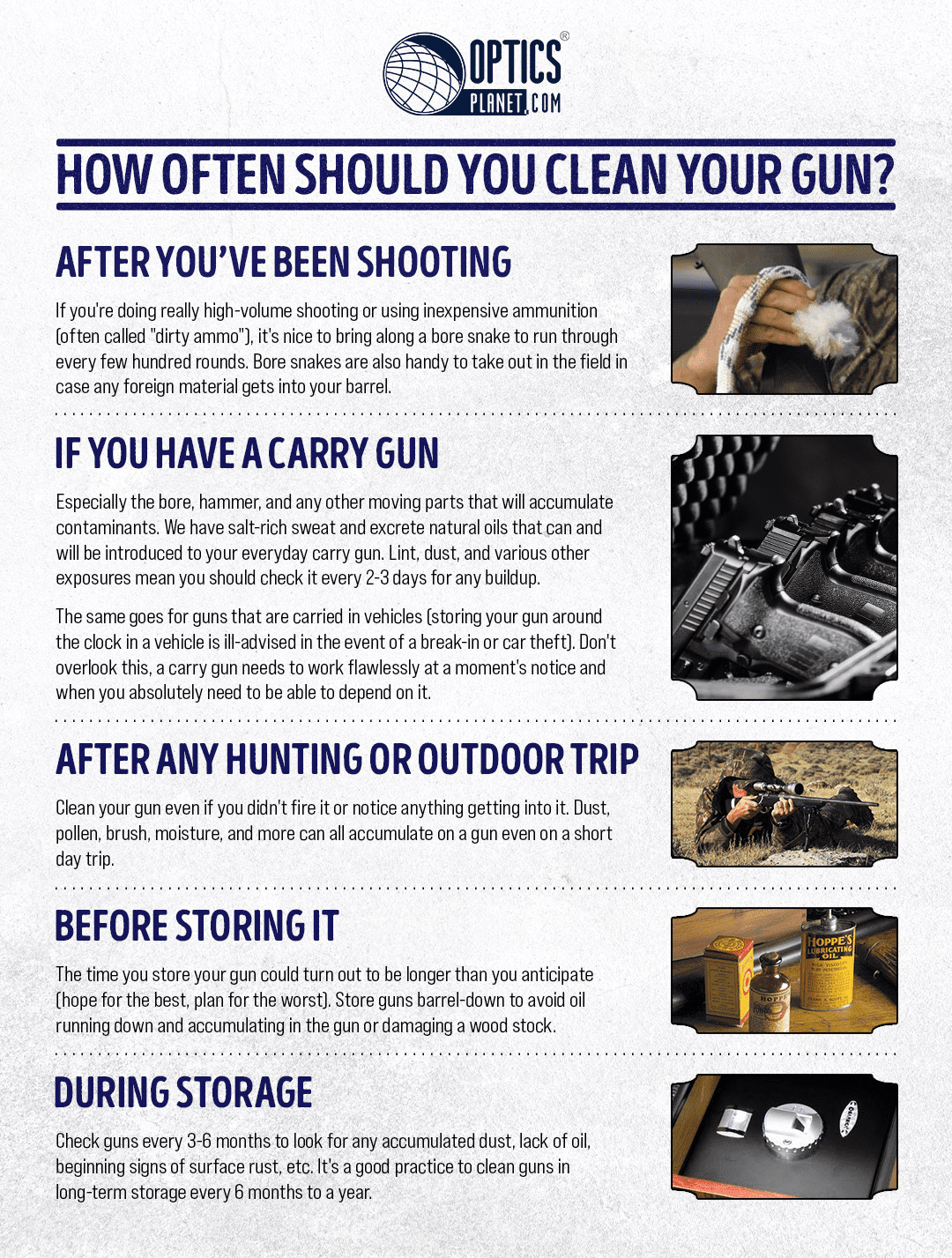You should clean your hunting rifle after every use and check it monthly for signs of rust or corrosion. Regular maintenance ensures optimal performance and safety.
Maintaining your hunting rifle is crucial for both accuracy and longevity. Neglect can lead to poor function and dangerous malfunctions. Cleanliness is especially vital after exposure to dirt, moisture, or after firing many rounds, as residues can build up inside the barrel and action.
A well-cared-for rifle not only provides a reliable and precise tool for your hunting adventures but also maintains its value over time. Proper cleaning involves a thorough wipe-down of all parts, careful inspection for wear, and meticulous lubrication to prevent rust and reduce friction. Every time you set out on a hunt or come back from the field, remember that a clean rifle is a hunter’s best friend, ensuring that every shot counts.

Credit: www.opticsplanet.com
Importance Of Keeping Your Hunting Rifle Clean
It’s crucial to keep a hunting rifle clean. A well-maintained firearm ensures peak performance out in the field. Dirt, debris, and residue can affect accuracy and reliability. Regular cleaning extends the life of a rifle.
Effects Of Dirt And Residue On Performance
A dirty rifle barrel can harm performance. Here’s what dirt does:
- Accuracy Drops: Debris in the barrel distorts bullet paths.
- Range Decreases: Residue buildup reduces bullet speed.
- Consistency Fails: Irregular deposits alter shot patterns.
Cleaning after each use prevents these problems. A routine wipe-down and deep clean after several uses keep a rifle in top shape.
Safety Concerns With A Neglected Firearm
A dirty rifle isn’t just less effective; it’s dangerous. Here’s why:
| Issue | Risk |
|---|---|
| Obstructions: | Debris can cause a barrel to burst. |
| Corrosion: | Rust weakens rifle parts, posing failure risk. |
| Mechanical Failure: | Grime slows down moving parts, leading to misfires. |
Regular checks keep a rifle safe to handle. A clean rifle doesn’t misfire or jam often. It protects both shooter and bystanders.

Credit: www.themeateater.com
General Guidelines For Rifle Maintenance
Maintaining your hunting rifle is crucial for accuracy and longevity. Without regular care, performance can falter. Follow these general guidelines for optimal rifle upkeep.
Recommended Cleaning Intervals
Clean your rifle after each use to avoid residue build-up. This ensures the best performance. If you store the rifle without using it, clean it every few months. This prevents rust and damage.
Variables That Affect Cleaning Frequency
- Environment: Dusty or wet conditions may require more frequent cleaning.
- Ammunition type: Some ammo leaves more residue than others.
- Shooting frequency: Regular shooters should clean more often.
- Storage conditions: Humid environments might necessitate more care.
Analyzing Shooting Conditions And Cleaning Needs
Understanding when to clean a hunting rifle is crucial for best performance. Not only does a well-maintained rifle ensure accuracy, but it also extends the firearm’s life. Analyze shooting conditions to tailor cleaning routines to specific needs.
Environmental Factors And Their Impact
Environmental conditions greatly affect your rifle’s cleaning needs. Consider the impact of these factors:
- Moisture: High humidity or wet conditions increase the risk of rust.
- Dust and Sand: These can abrade parts and affect accuracy.
- Cold Temperatures: May thicken lubricants, causing malfunctions.
- Mud and Debris: They can obstruct the barrel and action.
Clean more frequently if any of these conditions apply. Inspect after each use for signs of wear or contamination.
Adjusting Cleaning Schedules Based On Usage
Daily, weekly, or monthly cleaning schedules depend on rifle use. Regular maintenance includes:
- After Each Use: Briefly clean to remove residue.
- High-Usage Periods: Commit to detailed cleanings weekly.
- Low-Usage Periods: Monthly checks might suffice.
For rifles used in competitions or hunting trips, immediate post-use cleaning is best. A cleaning schedule can look like this:
| Usage | Cleaning Frequency |
|---|---|
| High (Daily or weekly use) |
After each session |
| Moderate (Monthly use) |
After each use, plus monthly inspection |
| Low (Seasonal use) |
Before storage, and before use |
Keep a log to track cleanings and rifle performance. It streamlines maintenance and highlights cleaning effectiveness.
Step-by-step Cleaning Process After Use
Care for your hunting rifle is critical after each use. A clean firearm ensures reliability, accuracy, and longevity. Proper cleaning might seem daunting, yet with a step-by-step guide, it becomes a simple task. Adhere to these procedures to maintain your rifle in prime condition.
Disassembly And Basic Cleaning
Begin the cleaning process with disassembly. Follow your rifle’s manual for safe breakdown steps. This usually involves removing the bolt and magazine.
- Check the rifle is unloaded. Safety first.
- Wipe down the exterior with a soft, lint-free cloth.
- Clear the barrel. Use a bore brush for any debris.
- Clean the action. A toothbrush can remove dirt.
- Apply solvent. Coat the inner barrel to dissolve residue.
- Wait a few minutes, then pass a clean patch through the barrel.
- Repeat with clean patches until one emerges spotless.
- Lubricate moving parts sparingly to avoid gunk build-up.
Deep Cleaning Techniques For Hunters
Occasional deep cleaning maintains peak rifle performance. This involves cleaning parts you don’t everyday.
- Disassemble further if comfortable. This could mean taking apart the trigger assembly or bolt.
- Soak metal parts in cleaner if needed. Follow this with a soft brush to remove tough residues.
- Perform focused cleaning on the bolt, paying attention to the firing pin and extractor.
- Inspect all components for wear or damage. Replace parts as necessary.
- Ensure dryness after cleaning. Any moisture can lead to rust.
- Re-lubricate all the parts as you reassemble the rifle.
- Function-check the reassembled rifle to guarantee proper operation.
A well-maintained rifle is a hunter’s best friend. Stay sharp in the field with these cleaning routines.
Advanced Maintenance Tips For Long-term Rifle Care
For hunters passionate about performance, regular rifle maintenance is critical. Beyond the basics, advanced care ensures longevity and precise shooting. From reducing wear to combating rust, advanced tips can elevate your firearm’s condition.
Lubrication And Protection From Corrosion
Proper lubrication helps parts move smoothly. Excess moisture can cause rust, potentially ruining your rifle. Use the right oil to keep every part working perfectly.
Lubricate the action with a high-quality gun oil. Apply a light coat to prevent attracting debris. For the barrel, use a solvent to clean before oiling. Always remove excess oil; a thin film is enough.
Storage Solutions To Prevent Damage
Even with regular cleaning, improper storage can harm your rifle. Control humidity to prevent metal and wood damage. Store in a cool, dry place.
- Use a gun safe or cabinet to protect from dust and moisture.
- Lockable racks are great for quick access while keeping guns secure.
- Desiccants absorb moisture within storage spaces.
- Silicone-treated gun socks repel water and shield against scratches.
Before storing, ensure your rifle is clean and lightly oiled. Check on it periodically, recoating with oil as necessary.
Utilizing Professional Services Vs. Diy
Keeping your hunting rifle clean is crucial for its performance and longevity. The question of whether to clean your rifle yourself or seek professional services is important. Do you trust yourself with the intricate components of your firearm, or do you prefer handing it over to a gunsmith? Let’s delve into the advantages and caveats of both approaches.
When To Seek A Gunsmith
Professional gunsmith services are the go-to for complex issues beyond basic care. Here’s when to consider a gunsmith:
- Accuracy problems: If shots are inconsistent.
- Mechanical issues: When the rifle jams or misfires.
- Wear and tear: Visible signs of damage or erosion.
- Upgrades: Installing new components for better performance.
Professionals provide peace of mind with their expertise but can be costlier and less convenient than DIY methods.
Benefits Of Learning Personal Firearm Care
DIY rifle cleaning empowers owners with skills and knowledge. Benefits of personal care:
- Cuts down costs compared to professional services.
- Improves understanding of your firearm’s workings.
- Enables quick, regular maintenance for optimal function.
- Fosters a sense of pride and connection to your equipment.
Time invested in learning personal firearm care pays off in the field, ensuring your rifle is always in top condition.

Credit: www.pelican.com
Frequently Asked Questions On How Often Should You Clean Your Hunting Rifle
How Often Should A Rifle Bore Be Cleaned?
Clean a rifle bore after every use to maintain accuracy and prevent buildup. For infrequent shooters, a thorough cleaning every few months is adequate. Regular maintenance ensures optimal performance and longevity.
How Long Can A Gun Go Without Cleaning?
A gun’s maintenance frequency varies, but generally, it should not go more than a few months without cleaning, especially if used regularly. Regular cleaning ensures proper function and safety.
Do You Need To Clean Your Gun Every Time You Shoot It?
It’s advisable to clean your gun after every use to maintain performance and safety. Regular cleaning prevents build-up and ensures reliability.
Does Cleaning A Rifle Affect Accuracy?
Cleaning a rifle can improve accuracy by removing residue and obstructions. Regular maintenance ensures consistent performance and precision. Neglecting to clean can lead to accuracy issues.
Conclusion
Maintaining a clean hunting rifle is essential for accuracy and longevity. Aim for a deep clean after every use, or at least seasonally. Regular maintenance prevents malfunctions and preserves your firearm’s condition. Remember, responsible ownership includes proper care – keep your rifle pristine for optimal performance in the field.


